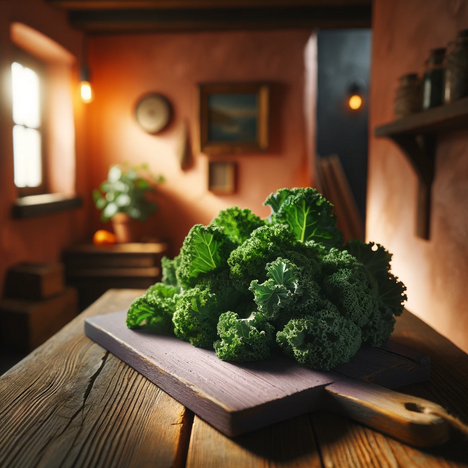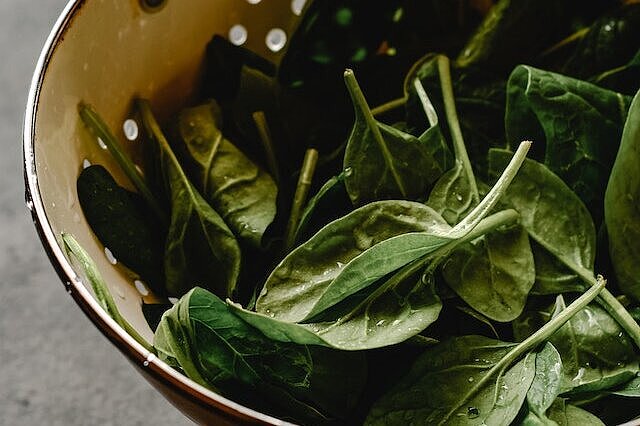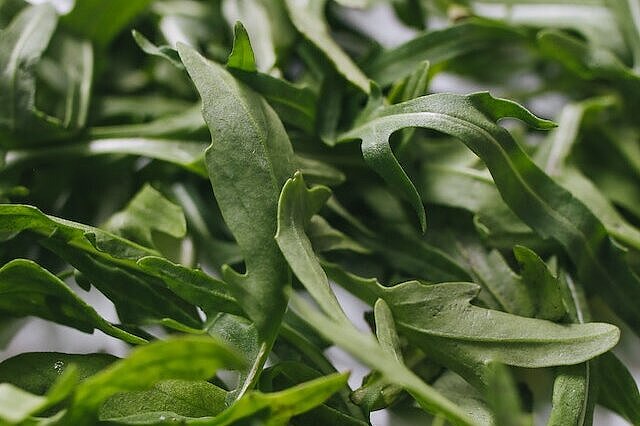Kale

Kale is a popular winter vegetable with lots of healthy ingredients. But is kale also suitable for dogs? In this article, you'll find out what kale is, what advantages and disadvantages it has for your dog and how best to prepare it.
What is kale?
Kale belongs to the cruciferous family and is closely related to broccoli, cauliflower and kohlrabi. It has large, curly leaves that can be green or purple, depending on the variety. Kale is mainly grown in northern Germany and is a typical ingredient in stews and casseroles. It has a slightly bitter taste and a firm consistency.
What are the benefits of kale for dogs?
Kale is rich in vitamins, minerals, antioxidants and fiber. It can help to boost the immune system, aid digestion and nourish the skin and coat. Kale can also have an anti-inflammatory effect and reduce the risk of certain types of cancer.
Kale contains the following nutrients, among others
- Vitamin A: supports vision, growth and mucous membranes
- Vitamin C: strengthens the immune system, protects against infections and promotes wound healing.
- Vitamin K: supports blood clotting and bone metabolism
- Folic acid: promotes cell division and the formation of red blood cells
- Calcium: strengthens bones, teeth and muscles
- Iron: transports oxygen in the blood and prevents anaemia
- Magnesium: regulates nerve and muscle function as well as energy metabolism
- Potassium: regulates water balance, blood pressure and heart rhythm
- Beta-carotene: acts as an antioxidant and protects against free radicals
- Lutein: acts as an antioxidant and protects the eyes from UV radiation
What are the disadvantages of kale for dogs?
Although kale is healthy for dogs, it should only be fed in moderation. Too much kale can lead to digestive problems such as flatulence, diarrhea or vomiting. Kale can also impair thyroid function if it is fed raw or in large quantities. This is because kale contains so-called glucosinolates, which can inhibit the absorption of iodine. Iodine is an important trace element for the formation of thyroid hormones.
If your dog suffers from hypothyroidism or is taking medication for it, you should therefore not feed it kale.
How do I prepare kale for my dog?
If you want to give your dog kale, you should always wash it well and cut it into small pieces. You should also always boil or steam it to reduce the glucosinolates and increase digestibility. You can serve kale as a side dish with meat or fish or mix it with other vegetables. However, be careful not to use too much salt or spices.
The recommended amount of kale for dogs is about one teaspoon per kilogram of body weight per day. This means, for example, that a 10 kg dog can have about 10 teaspoons of kale per day. However, this amount should not be exceeded.
Kale belongs to the cruciferous family and is rich in vitamins, minerals, antioxidants and fiber. For dogs, it can strengthen the immune system, aid digestion, nourish the skin and coat and have an anti-inflammatory effect. However, kale should be fed in moderation as too much can cause digestive problems and can affect thyroid function, especially if given raw or in large quantities. Kale should be well washed, boiled or steamed and served in small quantities.
Properties 7
Are you looking for other ingredients with a specific property?
Just click on them to find more.
If you notice any signs of hypersensitivity or poisoning in your dog, you should see your vet immediately. We are not a substitute for a vet, but we try to be as accurate as possible. Every dog reacts differently and we recommend you get a second opinion or consult your vet if in doubt.
Stay healthy and take good care of your four-legged friend!😊
Similar to Kale
Swiss chard is a plant that originally comes from the Mediterranean region. It has been used as a food and medicinal plant since ancient times. Swiss chard has large, dark green leaves and thick...
Spinach is a plant from the goosefoot family that originally comes from Asia. It has been cultivated and eaten as a vegetable for centuries. Spinach has large, dark green leaves that are rich in...
Rocket, also known as arugula, is a plant from the cruciferous family, which also includes broccoli, cabbage and mustard. Rocket originates from the Mediterranean region and has been used as a food...
Palm kale is rich in vitamins, minerals and antioxidants that support your dog's immune system and cellular health. It contains vitamins A, C, K, B6, folic acid, calcium, iron, magnesium and...



